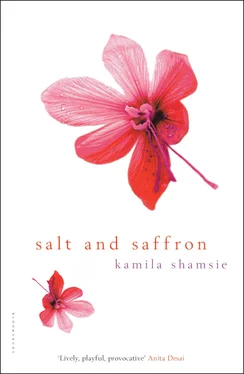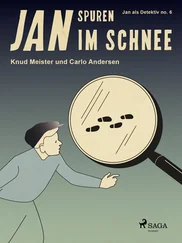‘Aba and Ami aren’t home yet.’
‘Yes, I know. Your father isn’t always clever.’ She reached into her handbag and pulled out a mobile phone. ‘He said he was calling from the house, but the display showed his office number.’
‘You have a mobile phone?’
‘I’m an uppie. A yuppie no longer young. Sameer suggested prefixing “geriatric” but I will not be a guppie.’
I wouldn’t allow myself to laugh, so instead I said archly, ‘Nothing less than smoked salmon for Dadi.’
‘I was thinking along the lines of a swordfísh.’
Had she always possessed this virtue of self-parody? Yes. That’s partly why I’d loved her so much. Why had all those relatives wasted so much time in talking about rapprochement? If they’d only thought, instead, of a way of bringing us together, physically together, so that I could see her ear lobes. Yes, I said ear lobes. As a child I was always fascinated by their softness; I would grip a lobe between thumb and finger and fall asleep, and nothing on earth would persuade Dadi to move while I still had her in my grip. When I’d wake up and say, ‘Dadi, you could have pushed me away,’ she’d reply, ‘My darling, one day you’ll push yourself away. I’m making the most of this while I can.’ I swore that would never happen.
I looked at her ears and felt an overwhelming anger towards myself. ‘I shouldn’t have slapped you.’
‘No shit, Sherlock, as your Americans would say.’
‘Dadi!’
She leant back and looked at me, amused. ‘English is capable of such vulgarity. But sometimes that’s good. When you live in euphemism you can’t speak to people who are accustomed to direct speech.’
‘Is this a euphemistic jab at me? What haven’t I understood?’
‘Love, Aliya. You never understood love.’
What I had never understood, I now saw quite clearly, was her. I had left at an age when understanding had only just become possible, and I’d spent the intervening years reducing her to a tilted head and a cheek that provoked slapping. How had I let myself do that? How could one remark undo eighteen years of love? Because hating Dadi was easier than facing the truth. I thought that, but then I didn’t know what it meant. What truth?
‘Sameer says you met Baji?’
I hadn’t been at all sure how to bring this up. But she seemed only curious; perhaps even relieved. ‘Yes.’
‘What did you talk about?’
‘The first not-quites. Kulsoom and Shahrukh. A story I’d never heard before.’
‘If you’d been around at all over the last few years I’m sure I would have told it to you by now.’ Her tone was entirely matter of fact. My anger caught me off guard. This time the anger was all outward. I really did hate her for the pretence that nothing had ever been wrong; the pretence that my absence meant nothing more than a few missed opportunities to tell family stories. I had felt, just seconds earlier, the urge to cry for having stayed away from her for so long, and she couldn’t even bring herself to acknowledge that there were moments when she had missed me.
‘Touché,’ I said, matching her tone of indifference. ‘I don’t believe you, but touché.’
Dadi raised her eyebrow just enough to let me know that I had come perilously close to accusing her of lying. ‘Did Baji mention me?’ And now I saw that she was, unmistakably, hungry for news of her family. My God, I thought, it’s only pride that’s kept her from writing a letter, making a phone call, doing something, anything, to get in touch with the family on ‘the other side’. Pride, and the fear of being rebuffed. Were those absurd reasons partly to blame for my decision not to call Dadi or write her a letter these past years? What else? What were my other reasons?
‘She asked how you were,’ I said. ‘Then she said she saw you in me.’
‘What did you do to deserve that?’ Dadi smiled sadly, and I thought back to that laughing girl framed in Baji’s apartment. No trace remained. ‘I always liked her, though I don’t think she knew that. I told you that once. Remember?’
I couldn’t say I did. Dadi persisted, ‘When you were studying twentieth-century thought at school. Condensed in one chapter of seven pages. The green history book. Remember?’
Yes, I remembered. Remembered that I had fallen asleep with the history book on my lap, and when I awoke Dadi was sitting beside me. She started talking about a cousin of hers whose mother had tantalizing elbows. She asked me two questions: ‘How does royalty treat a washerwoman? How does a daughter treat a mother?’ Before I could answer Dadi said, ‘What do you do when the two questions are really just one question?’ That was Baji’s story — convinced her father’s relatives considered her their inferior; equally convinced that her mother’s relatives should treat her as their superior. Dadi pointed at the bearded man on the open page of my text book. ‘Although she couldn’t demonstrate any sympathy for the lower classes herself, it was Baji who made a Marxist of me.’
A decade later, recalling that remark, I found it even more absurd than I had at the age of twelve. ‘Baji made a Marxist of you?’ I said to Dadi.
‘You’re thinking, If she’s a Marxist, I’m an eland,’ Dadi said. ‘But I was. So was Taimur. We were both so young.’
Elands. Yaks. We couldn’t be common and deal in dogs and goats. ‘And Akbar?’ I asked. ‘Did the two of you fall in love over shared political views?’
‘Akbar? He said the difference between a royal who inherits power and a plebian who achieves it —’ she used the word ‘plebian’ without a grain of self-consciousness — ‘is that the royal is tutored in the arts, in social graces, in subtlety. So his misuse of privilege is blanketed in ghazals and aadabs. The plebian, unused to power, hungry for it, desperate to grab it while it lasts, does not bother with niceties. And niceties, Akbar said, cannot be undervalued.’
‘You disagreed with this?’
Dadi shrugged. ‘Yes, but politely.’
‘With subtlety and art.’
‘Precisely.’
I didn’t know what to do with the silence that followed, so I picked up the morning newspaper and looked at the front page. ‘Who’s flaying who?’ Dadi asked.
There is no institution in the world which uses the word ‘flay’ as wantonly as the Karachi morning papers. Government flays opposition. Opposition flays PM. Politician flays bureaucracy. Journalists flay censorship. Batsmen flay bowlers. Hygienist flays fleas. Foreign Minister flays Foreign Hand. The other wantonly used word is ‘miscreant’. Whenever anything untoward happens — be it the spread of vulgar graffiti or the detonation of a bomb — miscreants are blamed. No one seems to realize that the seriousness of the crime is undermined by the use of the word ‘miscreant’, which conjures up an image of little gnomes scampering around with flaming torches in their hands. When the papers are feeling particularly reckless they’ll print a headline which announces that someone has flayed a miscreant.
‘I’ll say this for Akbar Dada’s theory.’ I tossed the paper aside. ‘If a politician flayed someone in verse, he’d get my vote.’
‘My darling, relative to the times, you’re a bigger snob than I was at your age.’
‘It’s intellectual snobbery.’
Dadi laughed. ‘Around here who but the privileged have the luxury to commit poems to memory?’
‘Your butcher, for one.’ Dadi’s butcher had his shop miles away from where she lived, but she wouldn’t hear of patronizing anyone else in the meat trade, because no other butcher could quote poetry so beautifully while slicing through hunks of flesh. ‘I wouldn’t vote for your butcher if he took to politics. I can’t dissociate him from the image of a cleaver.’
Читать дальше












